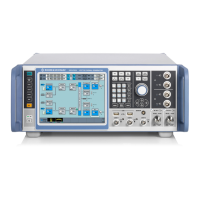Signal Routing and System Configuration
R&S
®
SMW200A
155User Manual 1175.6632.02 ─ 30
In the default state of the instrument, i.e. in "System Configuration > Mode = Stan-
dard", the baseband internal and external signals can be routed as defined in the
Table 4-8.
As shown in the table:
●
The internal baseband signal can be introduced into path A, path B or both
●
The external baseband signal of the first input module "BB Input A" can be fed into
path A, path B or both
●
The second baseband input module "BB Input B" is firmly connected to signal path
B
●
If internal signals from one or two paths are generated at the same time, all signals
in each path are summed.
Table 4-8: Possible baseband signal routing combinations (default instrument state)
Block in the block diagram To path A To path B To path A and B
"Baseband A" X X X
"Baseband B" X X X
"BB Input A" X X X
"BB Input B"
X
Interdependency between "Signal Routing" settings and "System Configuration"
settings
The signal routing settings are enabled for the following configurations:
●
"System Configuration > Mode = Standard"
●
"System Configuration > Mode = Advanced" with maximum two "Separate Base-
band Sources", e.g. in 1x2x2, 2x1x1 or 2x1x2 configurations
See also "The meaning of the short form representations of the fading and base-
band configurations" on page 110.
For an overview of the signal routing possibilities of the faded baseband signal, refer to
Chapter 4.4.1, "Fading and Baseband Configuration Settings", on page 125.
Signal Routing Settings

